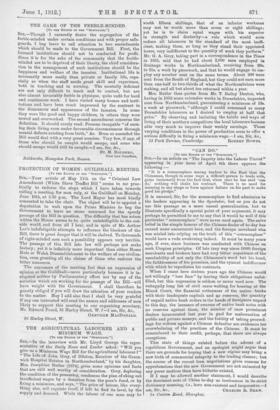THE AGRICULTURAL LABOURER AND A MINIMUM WAGE.
[TO THE EDITOR OF TIM "SPEOT•TOR."]
Sin,—In the interview with Mr. Lloyd George the repre- sentative of the Daily News and Leader asked: "Will you give us a Minimum Wage Bill for the agricultural labourer P" " The Life of John Grey, of Dilston, Receiver of the Green- wich Hospital Estates in Northumberland," by his daughter, Mrs. Josephine Butler (1874), gives some opinions and facts that are still well worthy of consideration. Grey, deploring the condition of the peasantry, condemns the plan of eking out insufficient wages by a donation from the poor's fund, or by fixing a minimum, and says, "The price of labour, like every- thing else, will regulate itself, if left to find its level, by the supply and demand. While the labour of one man may be worth fifteen shillings, that of an inferior workman may not be worth more than seven or eight shillings; yet he is to claim equal wages with his superior in strength and dexterity—a rule which would soon reduce all labourers to the standard of the most ineffi- cient, making them, so long as they stand their appointed hours, very indifferent to the quantity of work they perform." Mr. G. A. Grey, taking part in a correspondence in the Times in 1855, said that he had about 2,000 men employed in drainage works in Northumberland, receiving from 20s. to 25s. a week by piecework, and that he would engage to em- ploy any number sent on the same terms. About 200 were sent from the South of England, but they could not earn more than one-half to two-thirds of what the Northumbrians were making, and all but about ten returned within a year.
Mrs. Butler then quotes from Mr. T. Bailey Denton, who, having in 1852 some extensive works in Dorsetshire, imported men from Northumberland, guaranteeing a minimum of 18e. a week at piecework, " although I could command as many Dorsetshire labourers as I desired to employ at half that price." By observing and imitating the habits and ways of living of their northern competitors the local labourers became able very much to improve their weekly earnings. These varying conditions in the power of production seem to offer a serious difficulty in fixing a niinimunt wage.—I am, Sir, &e.,






































 Previous page
Previous page